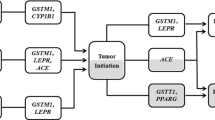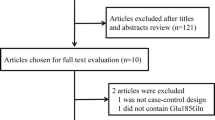Abstract
This study was conducted to investigate the association of genetic polymorphisms in the MnSOD and GPX1 genes with the risk and invasiveness of bladder cancer in a Turkish population. This prospectively designed study enrolled 157 patients with bladder cancer (mean age 63.2 ± 10.86 years) and 224 healthy controls (mean age 61.7 ± 8.39 years). Genotyping of the MnSOD Ala-9Val and GPX1 Pro198Leu polymorphisms was carried out by PCR–RFLP. No significant difference was found in MnSOD genotype distributions between the controls and the bladder cancer patients. However, the Leu/Leu genotype of GPX1 was associated with a significantly higher risk of bladder cancer than the Pro/Pro genotype. When stratified according to tumor stage, the Leu/Leu genotype of GPX1 was more frequently observed in bladder cancer patients with high-stage tumors than those with low-stage tumors. Additionally, patients carrying both Ala/Ala of MnSOD and Leu/Leu of GPX1 had the highest risk of developing bladder cancer. In conclusion, the present study indicates that the GPX1 Pro198Leu polymorphism may be associated with the risk and development of invasive bladder cancer. In addition, the combination of the MnSOD Ala/Ala and GPX1 Leu/Leu genotypes may have a synergistic effect on disease risk.
Similar content being viewed by others
References
Lamm DL, Griffith JG. Intravesical therapy: does it affect the natural history of superficial bladder cancer? Semin Urol. 1992;10:39–44.
MacVicar AD. Bladder cancer staging. BJU Int. 2000;86:111–22.
Yılmaz HH, et al. Cancer trends and incidence and mortality patterns in Turkey. Jpn J Clin Oncol. 2011;4:10–6.
Marcus PM, et al. Cigarette smoking, N-acetyltransferase 2 acetylation status, and bladder cancer risk: a case-series meta-analysis of a gene-environment interaction. Cancer Epidemiol Biomark Prev. 2000;9:461–7.
Zeegers MP, Kellen E, Buntinx F, Van den Brandt PA. The association between smoking, beverage consumption, diet and bladder cancer: a systematic literature review. World J Urol. 2004;21:392–401.
Hartge P, et al. Changing cigarette habits and bladder cancer risk: a case-control study. J Natl Cancer Inst. 1987;78:1119–25.
Frederiks WM, Bosch KS, Hoeben KA, Van Marle J, Langbein S. Renal cell carcinoma and oxidative stress: the lack of peroxisomes. Acta Histochem. 2010;112:364–71.
Pryor WA. Cigarette smoke radicals and the role of free radicals in chemical carcinogenicity. Environ Health Perspect. 1997;105:875–82.
Brown NS, Bicknell R. Hypoxia and oxidative stress in breast cancer. Oxidative stress: its effects on the growth, metastatic potential and response to therapy of breast cancer. Breast Cancer Res. 2001;3:323–7.
Wallace DC. Mitochondrial diseases in man and mouse. Science. 1999;283:1482–8.
Bandy B, Davison AJ. Mitochondrial mutations may increase oxidative stress: implications for carcinogenesis and aging? Free Radic Biol Med. 1990;8:523–39.
Arthur JR. The glutathione peroxidases. Cell Mol Life Sci. 2000;57:1825–35.
Shimoda-Matsubayashi S, et al. Structural dimorphism in the mitochondrial targeting sequence in the human manganese superoxide dismutase gene. A predictive evidence for conformational change to influence mitochondrial transport and a study of allelic association in Parkinson’s disease. Biochem Biophys Res Commun. 1996;226:561–5.
Sutton A, et al. The manganese superoxide dismutase Ala16Val dimorphism modulates both mitochondrial import and mRNA stability. Pharmacogenet Genomics. 2005;15:311–9.
Moscow JA, et al. Loss of heterozygosity of the human cytosolic glutathione peroxidase I gene in lung cancer. Carcinogenesis. 1994;15:2769–73.
Kaprio J. Science, medicine, and the future. Genetic epidemiology. BMJ. 2000;320:1257–9.
Ezzikouri S, et al. Polymorphisms in antioxidant defence genes and susceptibility to hepatocellular carcinoma in a Moroccan population. Free Radic Res. 2010;44:208–16.
Bica CG, et al. association of manganese superoxide dismutase gene polymorphism (Ala-9val9 and breast cancer in males and females. J Bras Patol Med Lab. 2007;43:219–25.
Hung RJ, et al. Genetic polymorphisms of MPO, COMT, MnSOD, NQO1, interactions with environmental exposures and bladder cancer risk. Carcinogenesis. 2004;25:973–8.
Wu SH, et al. Epistasis of oxidative stress-related enzyme genes on modulating the risks in oral cavity cancer. Clin Chim Acta. 2010;411:1705–10.
Peters U, et al. Variation in the selenoenzyme genes and risk of advanced distal colorectal adenoma. Cancer Epidemiol Biomark Prev. 2008;17:1144–54.
Hansen RD, et al. GPX1 Pro(198)Leu polymorphism, erythrocyte GPX activity, interaction with alcohol consumption and smoking, and risk of colorectal cancer. Mutat Res. 2009;664:13–9.
Ambrosone CB, et al. Manganese superoxide dismutase (MnSOD) genetic polymorphisms, dietary antioxidants, and risk of breast cancer. Cancer Res. 1999;59:602–6.
Ratnasinghe D, et al. Glutathione peroxidase codon 198 polymorphism variant increases lung cancer risk. Cancer Res. 2000;60:6381–3.
Poulsen HE. Oxidative DNA modifications. Exp Toxicol Pathol. 2005;57:161–9.
Hempel N, Ye H, Abessi B, Mian B, Melendez JA. Altered redox status accompanies progression to metastatic human bladder cancer. Free Radic Biol Med. 2009;46:42–50.
Badjatia N, Satyam A, Singh P, Seth A, Sharma A. Altered antioxidant status and lipid peroxidation in Indian patients with urothelial bladder carcinoma. Urol Oncol. 2010;28:360–7.
Khan A, Tania M, Zhang DZ, Chen HC. Antioxidant enzymes and cancer. Chin J Cancer Res. 2010;22:87–92.
Kucukgergin C, Sanli O, Tefik T, Aydın M, Ozcan F, Seckin S. Increased risk of advanced prostate cancer associated with MnSOD Ala-9-Val gene polymorphism. Mol Biol Rep. 2011. doi:10.1007/s11033-011-0725-2.
Ichimura Y, et al. Increased risk of bladder cancer associated with a glutathione peroxidase 1 codon 198 variant. J Urol. 2004;172:728–32.
Terry PD, Umbach DM, Taylor JA. No association between SOD2 or NQO1 genotypes and risk of bladder cancer. Cancer Epidemiol Biomark Prev. 2005;14:753–4.
Cengiz M, Ozaydin A, Ozkilic AC, Dedekarginoglu G. The investigation of GSTT1, GSTM1 and SOD polymorphism in bladder cancer patients. Int Urol Nephrol. 2007;39:1043–8.
Ho JC, et al. Manganese superoxide dismutase and catalase genetic polymorphisms, activity levels, and lung cancer risk in Chinese in Hong Kong. J Thorac Oncol. 2006;1:648–53.
Martin RC, et al. No apparent association between genetic polymorphisms (−102 C > T) and (−9 T > C) in the human manganese superoxide dismutase gene and gastric cancer. J Surg Res. 2005;124:92–7.
Bermano G, Arthur JR, Hesketh JE. Role of the 3’ untranslated region in the regulation of cytosolic glutathione peroxidase and phospholipid-hydroperoxide glutathione peroxidase gene expression by selenium supply. Biochem J. 1996;320:891–5.
Hu YJ, Diamond AM. Role of glutathione peroxidase 1 in breast cancer: loss of heterozygosity and allelic differences in the response to selenium. Cancer Res. 2003;63:3347–51.
Ravn-Haren G, et al. Associations between GPX1 Pro198Leu polymorphism, erythrocyte GPX activity, alcohol consumption and breast cancer risk in a prospective cohort study. Carcinogenesis. 2006;27:820–5.
Lee CH, et al. Effects of oxidative DNA damage and genetic polymorphism of the glutathione peroxidase 1 (GPX1) and 8-oxoguanine glycosylase 1 (hOGG1) on lung cancer. J Prev Med Public Health. 2006;39:130–4.
Zhao H, Liang D, Grossman HB, Wu X. Glutathione peroxidase 1 gene polymorphism and risk of recurrence in patients with superficial bladder cancer. Urology. 2005;66:769–74.
Abe M, et al. Single-nucleotide polymorphisms within the antioxidant defence system and associations with aggressive prostate cancer. BJU Int. 2011;107:126–34.
Ahn J, et al. No association between glutathione peroxidase Pro198Leu polymorphism and breast cancer risk. Cancer Epidemiol Biomark Prev. 2005;14:2459–61.
Raaschou-Nielsen O, et al. GPX1 Pro198Leu polymorphism, interactions with smoking and alcohol consumption, and risk for lung cancer. Cancer Lett. 2007;247:293–300.
Arsova-Sarafinovska Z, et al. Glutathione peroxidase 1 (GPX1) genetic polymorphism, erythrocyte GPX activity, and prostate cancer risk. Int Urol Nephrol. 2009;41:63–70.
Cox DG, Tamimi RM, Hunter DJ. Gene × Gene interaction between MnSOD and GPX-1 and breast cancer risk: a nested case-control study. BMC Cancer. 2006;6:217.
Acknowledgments
This work was supported by the Research Fund of Istanbul University, project number: 11658.
Author information
Authors and Affiliations
Corresponding author
Rights and permissions
About this article
Cite this article
Kucukgergin, C., Sanli, O., Amasyalı, A.S. et al. Genetic variants of MnSOD and GPX1 and susceptibility to bladder cancer in a Turkish population. Med Oncol 29, 1928–1934 (2012). https://doi.org/10.1007/s12032-011-0057-z
Received:
Accepted:
Published:
Issue Date:
DOI: https://doi.org/10.1007/s12032-011-0057-z




